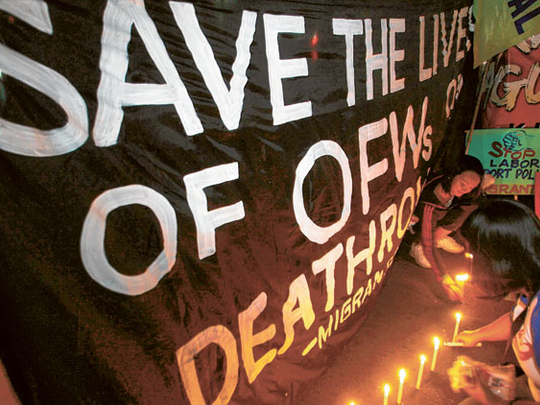
Manila: A 35-year-old Filipino sentenced for drug trafficking was executed at noon yesterday in Guangxi, China, Vice-President Jejomar Binay announced.
The Filipino, who remained unidentified at the request of his family, was executed by lethal injection at around 12.30pm.
"The execution had been carried out," Binay, who is in Bali, was quoted in reports as saying.
He said that prior to the execution, the Filipino was able to see his family, who flew in from the Philippines, and talk with them for a few minutes. The Vice-President said that the Philippine national only knew about his pending execution on the day the Supreme People's Court promulgated the sentence.
The Filipino was arrested at Guilin International Airport in 2008 for carrying nearly 1.5 kilos of heroin into China.
China has strict laws against the smuggling of drugs and other illicit substances and the executed Filipino is the fourth drug smuggler from his country to be meted the death sentence this year.
Humanitarian grounds
According to Binay, the remains of the executed Filipino will be with his family within the coming week.
Meanwhile, Philippine Department of Foreign Affairs (DFA) Spokesman Raul Hernandez said that the execution would not affect relations between China and the Philippines.
The DFA said the Filipino had attempted to enter China through Malaysia.
On December 6, Binay personally delivered to the Chinese Embassy in Makati City the letter of President Benigno Aquino to President Hu Jintao asking for the commutation of the death sentence of the Filipino. Charge d'Affaires Bai Tian, received President Aquino's letter which contained the following words: "We fully respect the laws of China and we are appealing to you on humanitarian grounds."
In a related development, the Philippine Embassy in Kuala Lumpur conveyed to Malaysian law enforcement authorities the need for closer cooperation to combat drug smuggling.
The DFA said that in a call to Royal Malaysia Police Narcotics Crime Investigation Department (NCID) Director Datuk Noor Rashid Bin Ebrahim on December 7, Consul General Renato Villa expressed the Embassy's great concern at the use of Malaysia as a transit point by West African and other international drug syndicates to deliver illegal drugs to other countries, especially China.
The NCID director acknowledged the need for closer cooperation between Malaysia and the Philippines to combat drug smuggling.
He said that Malaysians had also been victimised and lured to become mules by drug syndicates.
The Malaysian official said he looked forward to the eventual conclusion of the proposed Memorandum of Understanding between the two countries on combating transnational crimes, including drug smuggling, as it would serve to facilitate bilateral cooperation and the exchange of information.











